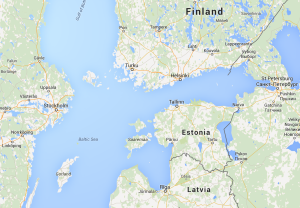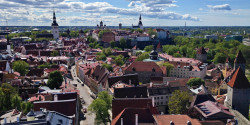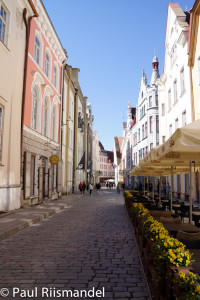 I spent a long weekend in Estonia’s capital city, Tallinn, a couple of weeks ago. My father’s parents are from Estonia and it was my first time there. I had the fantastic opportunity to meet many relatives for the first time. Though my schedule was packed pretty tightly I did manage to sneak some radio listening.
I spent a long weekend in Estonia’s capital city, Tallinn, a couple of weeks ago. My father’s parents are from Estonia and it was my first time there. I had the fantastic opportunity to meet many relatives for the first time. Though my schedule was packed pretty tightly I did manage to sneak some radio listening.
Estonia is a country of 1.3 million people located south of Finland across the Baltic Sea, with Russia to the east and Latvia to the south. It was illegally annexed by the Soviet Union during World War II and declared independence in 1991. Today Estonia is a democratic parliamentary republic and a member of both the European Union and NATO.
My wife and I stayed in a nice studio apartment in the center of Tallinn’s Old Town. These days Old Town is a popular tourist destination both because it’s a beautiful and mostly-preserved Medieval city full of shops, restaurants, cafés and amazing architecture dating as far back as the 11th century, and also because Estonia is inexpensive compared to many other European destinations.
Estonia has both public and private, commercial broadcasting. Estonian Public Broadcasting, Eesti Rahvusringhääling or ERR, has been around since 2007, when it was created through the consolidation of Estonian public radio and TV. ERR operates five national radio channels broadcasting talk, rock music, classical and jazz music in Estonian. One channel, Raadio 4, offers programming for linguistic minorities–principally in Russian–and another, Raadio Tallinn, offers programming in a variety of major European languages.
Because I don’t speak Estonian or Russian I wasn’t able to understand the talk programming, though I heard the BBC World Service several times on Raadio Tallinn. I tried to listen to the new rock music focused Raadio 2, but was never quite sure if I had it tuned in because I use a small analog travel radio without a precise digital readout, and my lack of facility with the language means I didn’t comprehend the station IDs.
I was impressed by Klassikaraadio, putting it on in our apartment several times during the weekend. The first time I listened in the mid-morning the station was playing some Medieval chants, followed by a small ensemble playing piano music with a definite jazz inflection. Later I heard a small string ensemble playing what was likely a 20th century piece, marked by many bent notes and an occasionally free time signature. Though I was impressed by Klassikaraadio’s eclecticism, it does pay attention to the time-honored classics–the next day I heard a selection from Mozart’s The Marriage of Figaro.
Tallinn’s commercial music radio stations sound pretty similar to those heard elsewhere in Europe. They feature a pretty healthy dose of American, British and European pop music, mostly in English, usually spanning a few decades, from the 80s to the present. Sky Radio–which I primarily heard in the car and could identify because of an RDS display–typifies this, though with a more contemporary pop concentration.
These stations seem to be constantly present in most shops and restaurants–especially those catering to tourists. Still, I was glad also to hear some pop songs in both Estonian and Russian (while I don’t speak either language, I’ve had enough exposure to both to pick them out.)
All of these stations are on the FM dial. That’s because–as I was surprised to find–Estonia has just one AM, or medium wave, station. It’s a Russian-language Christian station called Tartu Family Radio, based in Tartu, Estonia’s second largest city, about 110 miles to the southeast of Tallinn. Though it broadcasts with an astounding 200,000 watts of power, I’m not sure I was able to hear it–or, at least I couldn’t identify it easily. Scanning around the AM dial the other strong signals were in Russian or other Slavic languages, though I think I picked out some German, too.
The Eurovision Song Contest happened that weekend, and Estonians were quite excited for their national entry, which finished at a very respectable 7th place out of 40. Though I presume there was some kind of radio coverage, I watched it live on television with family, as did some 200 million other people around the world (though not the US).
Four days was definitely too short of a time in Estonia–this was a side jaunt as part of a longer trip to Sweden. I’m already making plans to return for a longer time next year, making sure to travel the gorgeous countryside, shoreline and forests.




